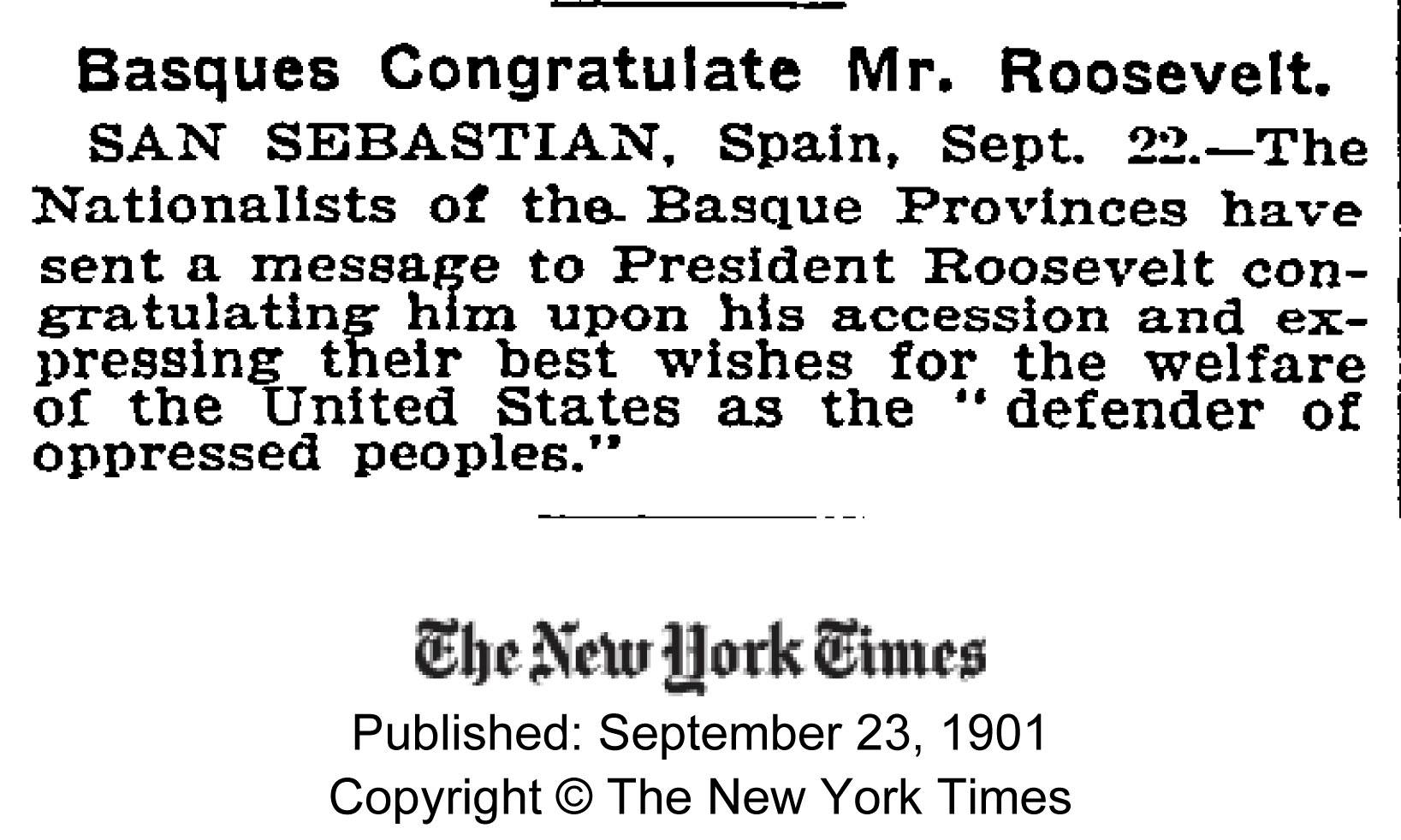This article was translated by John R. Bopp
We wanted to bring you today a news item about Basques that appeared in our beloved New York Times, about 100 years ago! It’s an article that reinforces our perception that, from the very beginning, the Basque nationalist movement considered two lines of action strategic. On the one hand, a good relationship with other countries, in order to explain the Basques’ situation as a nation without a state and deprived of its rights. On the other, the support of other peoples in achieving their national rights.
This discovery, at least for us, is a consequence of the effort of several historians, with or without a degree, who have been discovering the truth about the history or our people. It’s a truth that, in many cases, is hidden by historians who research and write with a “Spanish” or “French” outlook on events, and who are enthusiastically determined to make everything fit in, even if hammered in, with the argument (and political line) of the “eternal existence” of Spain or France.
But let’s get to the news that has caused us to write this blog entry.
It’s known that the founder of the Basque nationalist movement and of the Basque National Party (PNV), Sabino de Arana y Goiri, congratulated Theodore Roosevelt, the president of the United States, by telegram on May 25, 1902 for granting Cuba’s independence, which was granted on May 20, 1902.
Roosevelt, President United States, Washington. Name Basque Nationalist Party. Congratulate for liberating Cuba for Very Noble Federation you preside over that knew how to free from slavery. Example magnanimousness and tribute to Justice and Freedom, which you give to your powerful States, unknown History and inimitable for European powers, especially Latin ones. If Europe also imitated Basque nation, its oldest people, that for centuries enjoyed freedom ruled by Constitution that the United States gets praised for, it would be free.–Arana Goiri
In a time of colonialism, in which the great European powers divided up Africa and Asia, in Europe, it was inconceivable that a government would renounce colonial control over a territory as rich and important as Cuba. Of course, it must be remembered that this most certainly did not happen in the case of Puerto Rico and the Philippines.
But at that time, four years after the end of the Spanish-American War, that decision to create a new, sovereign state caused an international furore, especially in the Kingdom of Spain, which had still not recovered from the loss of those last few remnants of its empire on which the sun never set three centuries prior.
Those same reasons also caused a feeling of solidarity with Cuba and a sympathy for the US for having made that decision within the Basque nationalist movement, which, with its clear vision for a Basque state, had been born only 10 years before.
That telegram, which never reached its destination as it was sent to the Civil Governor in Spain instead of the President of the US, was the cause of what would end up being Sabino Arana’s last jail sentence, as he died not long after being released. He was jailed for the crime of stimulating a rebellion. That telegram also hardened the persecution the Spanish authorities inflicted on Basque nationalism.
This story of the Basques is generally well known, though it may only be for the simple fact that that telegram was never sent. Even so, it was the trigger for important events within the Basque Country.
On the other hand, what many don’t know, even those we’re writing about here, is that almost a year before, there was another telegram that did reach the hands of the then recently-elected President of the USA, Theodore Roosevelt, who had come to the presidency after William McKinley was assassinated on September 14, 1901.
At that time, the Cuban independence process was underway, after the expulsion of Spanish colonial troops, and its Constitution had been approved on February 21, 1901, drafted by the Constitution Assembly elected in 1900. So, there was only a year left before May 20, 1902 would bring forth the new nation of the Republic of Cuba, and that famous telegram from Sabino Arana would be sent and intercepted.
It’s thus easy to understand the interest Basque nationalists felt at that time, and which was undoubtedly projected onto what would be their first international political activity: sending a telegram to the recently sworn-in president, congratulating him and wishing the US, the “defender of oppressed peoples,” the best.
It was one of the first steps Basque nationalists took in developing international relations, which would end up being an extremely important policy during the terrible years of the Spanish Civil War and the exile.
But what makes this telegram special is not its being sent, which would demonstrate those PNV leaders’ vision, but rather the fact that the White House saw it as important enough that they reported to the press on September 22 that the newly-named President had received it, even among all the letters and telegrams he must have received at that time.
And the New York Times, once again showing the fondness for the Basque it’s felt since the 19th century and which we will continue exploring, also saw the news as important enough to give it some lines on page 2 of its September 23, 1901 edition.
By the way, thanks to all those responsible for having uncovered this part of the History of the Basques–how much more is there still to discover?
The New York Times – 23/9/1901 – USA
Basques congratulate Mr. Roosevelt

(Original)
Last Updated on Dec 20, 2020 by About Basque Country





